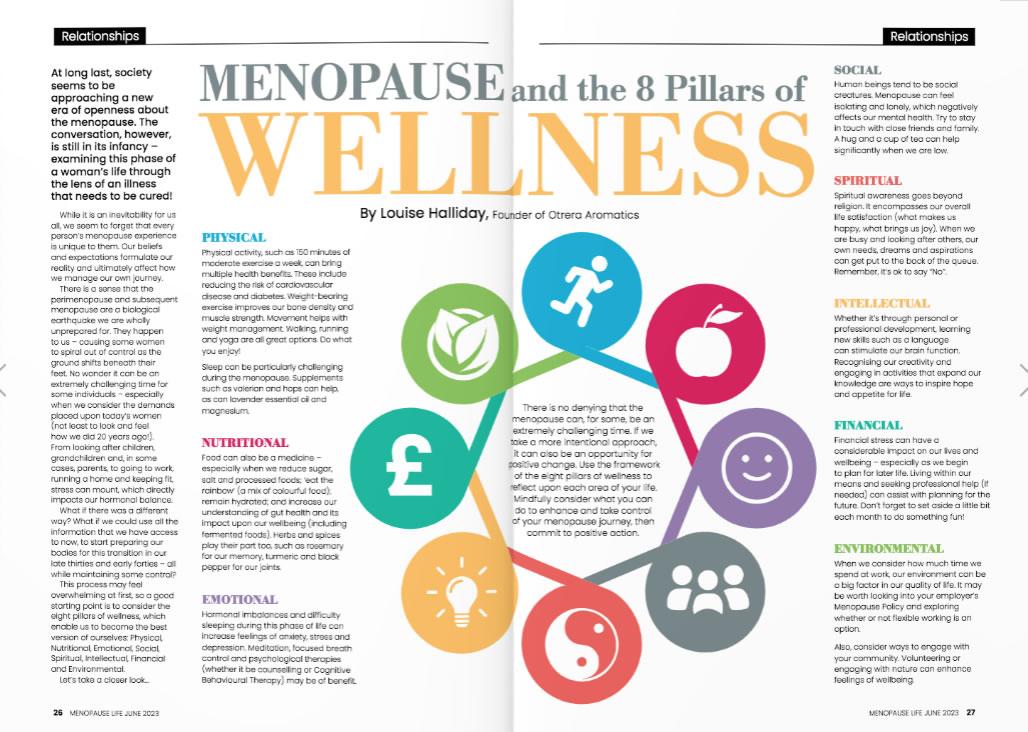
Mindful Menopause and the 8 pillars of Wellness – as featured in Menopause Life Magazine June
At long last, society seems to be approaching a new era of openness about the menopause. The conversation, however, is still in its infancy – examining this phase of a woman’s life through the lens of an illness that needs to be cured!
While it is an inevitability for us all, we seem to forget that every person’s menopause experience is unique to them. Our beliefs and expectations formulate our reality, and ultimately affect how we manage our own journey.
There is a sense that the perimenopause and subsequent menopause are a biological earthquake we are wholly unprepared for. They happen to us – causing some women to spiral out of control as the ground shifts beneath their feet. No wonder it can be an extremely challenging time for some individuals – especially when we consider the demands placed upon today’s women (not least to look and feel how we did 20 years ago!). From looking after children, grandchildren and, in some cases, parents, to going to work, running a home and keeping fit, stress can mount, which directly impacts our hormonal balance.
What if there was a different way? What if we could use all the information that we have access to now, to start preparing our bodies for this transition in our late thirties and early forties – all while maintaining some control?
This process may feel overwhelming at first, so a good starting point is to consider the eight pillars of wellness, which enable us to become the best version of ourselves: Physical, Nutritional, Emotional, Social, Spiritual, Intellectual, Financial and Environmental.
Let’s take a closer look…
Physical
Physical activity, such as 150 minutes of moderate exercise a week, can bring multiple health benefits. These include reducing the risk of cardiovascular disease and diabetes. Weight-bearing exercise improves our bone density and muscle strength. Movement helps with weight management. Walking, running and yoga are all great options. Do what you enjoy!
Sleep can be particularly challenging during the menopause. Supplements such as valerian and hops can help, as can lavender essential oil and magnesium.
Nutritional
Food can also be a medicine – especially when we reduce sugar, salt and processed foods; ‘eat the rainbow’ (a mix of colourful food); remain hydrated; and increase our understanding of gut health and its impact upon our wellbeing (including fermented foods). Herbs and spices play their part too, such as rosemary for our memory, turmeric and black pepper for our joints.
Emotional
Hormonal imbalances and difficulty sleeping during this phase of life can increase feelings of anxiety, stress and depression. Meditation, focused breath control and psychological therapies (whether it be counselling or Cognitive Behavioural Therapy) may be of benefit.
Social
Human beings tend to be social creatures. Menopause can feel isolating and lonely, which negatively affects our mental health. Try to stay in touch with close friends and family. A hug and a cup of tea can help significantly when we are low.
Spiritual
Spiritual awareness goes beyond religion. It encompasses our overall life satisfaction (what makes us happy, what brings us joy). When we are busy and looking after others, our own needs, dreams and aspirations can get put to the back of the queue. Remember, it’s ok to say “No”.
Intellectual
Whether it’s through personal or professional development, learning new skills such as a language can stimulate our brain function. Recognising our creativity and engaging in activities that expand our knowledge are ways to inspire hope and appetite for life.
Financial
Financial stress can have a considerable impact upon our lives and wellbeing – especially as we begin to plan for later life. Living within our means and seeking professional help (if needed) can assist with planning for the future. Don’t forget to set aside a little bit each month to do something that is fun!
Environmental
When we consider how much time we spend at work, our environment can be a big factor in our quality of life. It may be worth looking into your employer’s Menopause Policy and exploring whether or not flexible working is an option.
Also, consider ways to engage with your community. Volunteering or engaging with nature can enhance feelings of wellbeing.
There is no denying that the menopause can, for some, be an extremely challenging time. If we take a more intentional approach, it can also be an opportunity for positive change. Use the framework of the eight pillars of wellness to reflect upon each area of your life; mindfully consider what you can do to enhance and take control of your menopause journey; then commit to positive action.

